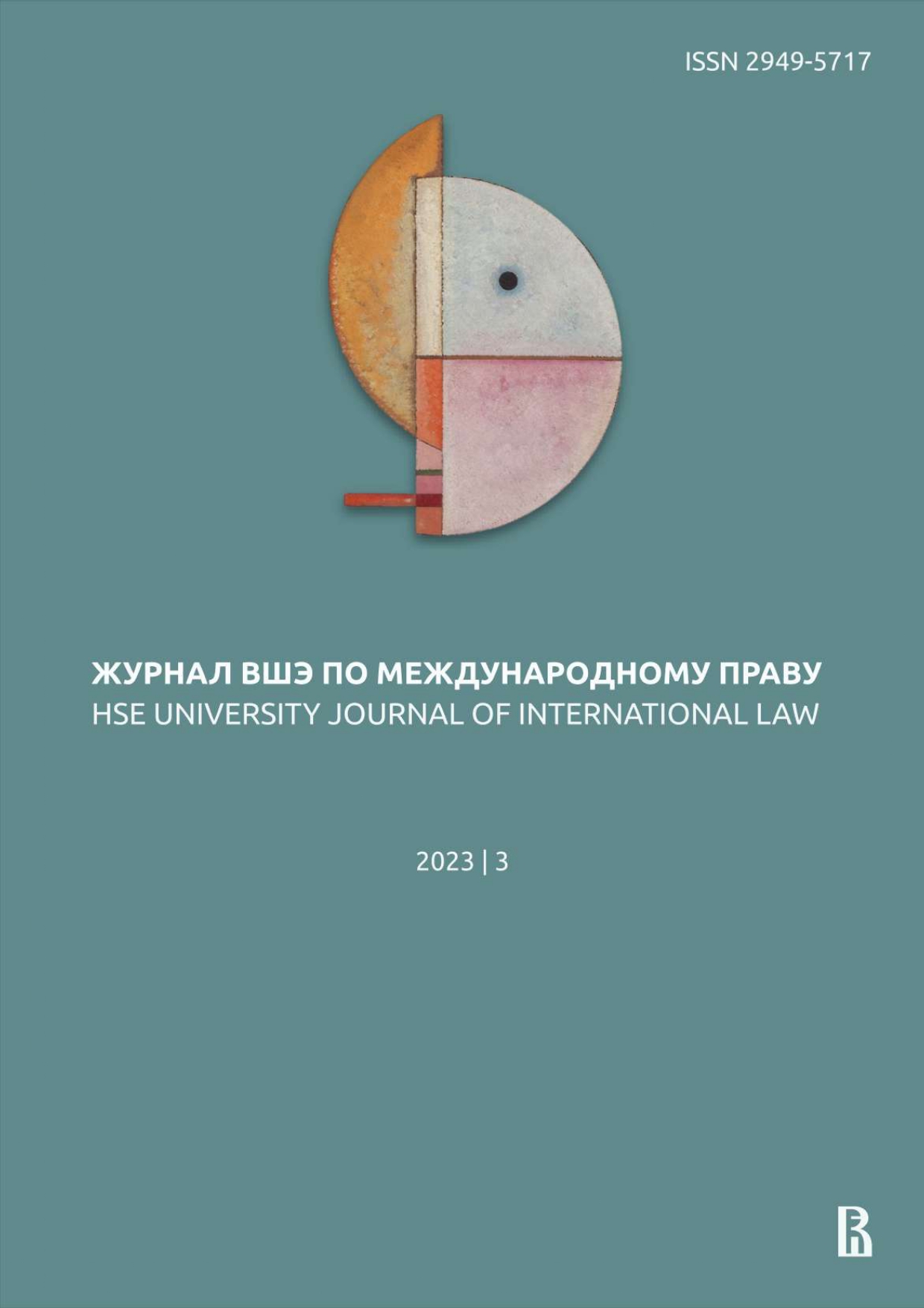Interpretation of “Investments” and “Investors” in the Russia-Belgium/Luxembourg BIT: Seeking Ways to Resolve the Case of NSD
Abstract
The paper addresses jurisdictional issues on the case of NSD initiating investment arbitration against Belgium/Luxembourg. Under the Russia-Belgium/Luxembourg BIT, the states undertake to prevent expropriation of investments and, if it does happen, to pay timely and fair compensation. Such “expropriation” may also occur due to sanctions. Being a Russian intermediate custodian for a number of foreign securities, the NSD has accounts with the centralized European securities Euroclear/Clearstream depositories. Since the inclusion of the NSD in the list of entities provided for in Annex I of EU Regulation no. 269/2014 in June 2022, transactions with the securities were suspended, NSD’s account with Euroclear/Clearstream was blocked. Because the NSD accounts with foreign securities depositories were blocked, it became impossible to transfer non-Russian securities from a securities account opened with the NSD to another Russian or foreign securities depository. One of the ways to challenge the consequences of Euroclear/Clearstream actions is to file a claim with the investment tribunal against Belgium/Luxembourg. The case has two potential solutions: mass claim from the end-investors or one single claim by the NSD as a “nominee holder” of the end-investors’ securities. The first option might seem time- and resource-costly, which is why a claim by the NSD might seem more attractive. Hence, using the interpretation instruments of public international law, the paper aims at assessing the perspectives of initiating investment arbitration proceedings by the NSD, thereby focusing on interpretation of the two central terms in the Russia-Belgium/Luxembourg BIT — “investor” and “investment”. The paper concludes that prima facie the investment tribunal would have jurisdiction over the case rationae personae nonetheless the “nominee holder” status of the NSD, as well as jurisdiction ratione materiae, where the blocked securities could constitute an “investment” in the sense of the BIT. Consequently, the paper defines the legal capacity of nominee holders to initiate arbitration. Since the issue has never been raised before, the paper draws an analogy with the case law on shell companies.
Downloads
References
Aaken A. van (2015) International Investment Law and Decentralized Targeted Sanctions: An Uneasy Relationship. Columbia FDI Perspectives.
Allen F., Gale D. (1994) Financial Innovation and Risk Sharing, Cambridge, MAs: MIT Press. DOI: https://doi.org/10.2307/2235142
Ahn T. (2018) The Applicability of Economic Sanctions to the Merits in International Arbitration Proceedings: With a Focus on the Dynamics between Public International Law Principles, Private International Law Rules and International Arbitration Theories. Pepperdine Dispute Resolution Journal, vol. 18, pp. 299–323.
Amado J., Kern J., Doe Rodriguez M. (2018) Jurisdiction Ratione Personae: The Foreign Investor. In: Arbitrating the Conduct of International Investors, Cambridge: Cambridge University Press, pp. 82–97. DOI: https://doi.org/10.1017/9781108235051.005
Bakos A. C. (2022) Economic sanctions in International Investment Arbitration, JusMundi.
Binns J. (2023) Challenging UK sanctions designations under SAMLA 2018, LexisNexis.
Bischoff J., Happ R. (2015) “The Notion of Investment”. In: Bungenberg M. et al (eds.) International Investment Law: A Handbook, Portland: Hart Publishing. DOI: https://doi.org/10.5771/9783845258997-544
Broches A. (1972) The Convention on the Settlement of Investment Disputes Between States and Nationals of Other States, Brill Nijhoff. DOI: https://doi.org/10.1163/9789004640757_014
Burgstaller M. (2006) Nationality of Corporate Investors and International Claims Against the Investor's Own State. The Journal World Investment & Trade, vol. 7, no. 6, pp. 857–881. DOI: https://doi.org/10.1163/221190006x00027
Dumberry P. (2018) A Guide to State Succession in International Investment Law, Edward Elgar Publishing. DOI: https://doi.org/10.4337/9781788116619
Eriksson M. (2009) In Search of a Due Process – Listing and Delisting Practices of the European Union, Department of Peace and Conflict Research Uppsala University.
Heisken V. (2010) Of Capital Import: The Definition of “Investment” In International Investment Law. In: Hoffman A. (ed.) Protection of Foreign Investments through Modern Treaty Arbitration. ASA Special Series, no. 34. pp. 51–73.
Hofer A. (2017) The Developed/Developing Divide on Unilateral Coercive Measures: Legitimate Enforcement or Illegitimate Intervention? Oxford University Press, vol. 16, no. 2. pp. 175–214. DOI: http://doi.org/10.1093/chinesejil/jmx018
Kirtley W. (2020) How To Reduce the Overall Costs of Investment Treaty Arbitration, Aceris Law LLC.
Levashova Y., Mercédeh A. (2022) Investment Claims Against Russia in the Economic Sanctions Era, Kluwer Arbitration Blog.
Masahiko A. (2020) Economic Sanctions in International Law and Practice, Routledge Publishing. DOI: https://doi.org/10.4324/9780429052989
McCarl R. (2015) ICSID Jurisdiction over International Mass Investment Arbitrations: Due Process and Default Rules. Stanford Journal of International Law, vol. 51, pp. 173–194.
Menkes M.J. (2019) The Legality of US Investment Sanctions against Iran before the ICJ: A Watershed Moment for the Essential Security and Necessity Exception. Annuaire Canadien de Droit International, vol. 56. pp. 328–364. DOI: http://doi.org/10.1017/cyl.2019.19
Niederberger A., Biersteker T. (2022) UN Individual Sanctions Listing and Delisting Patterns and Their Interaction with Autonomous Measures: Considerations for Mediators. Sanctions and Mediation Policy Memo Series: Policy Memo 3/3, New York: United Nations University.
Nougayrede D. (2020) After the Panama Papers: A Private Law Critique of Shell Companies, The International Lawyer, vol. 52, no. 357.
Nystedt J. (1994) Derivative Market Competition: OTC Markets Versus Organized Derivative Exchanges. IMF Working Paper WP/04/61. DOI: http://doi.org/10.5089/9781451848205.001
Ruys T., Ryngaert C. (2020) Secondary Sanctions: A Weapon Out of Control? The International Legality Of, And European Responses To, Us Secondary Sanctions. The British Yearbook of International Law. DOI: http://doi.org/10.1093/bybil/braa007
Ruys T., Angelet N. (2022) Immunity, inviolability and countermeasures – a closer look at non-UN targeted sanctions. Cambridge Handbook on Immunities and International Law. DOI: http://doi.org/10.1017/9781108283632.034
Strong S.I. (2013) Class, Mass, and Collective Arbitration in National and International Law. New York, NY, USA: Oxford University Press. DOI: https://doi.org/10.1093/arbint/aiv025
Vandekerckhove K. (2007) Piercing The Corporate Veil. European Company Law, vol. 4, no. 5., pp. 191–200. DOI: https://doi.org/10.54648/eucl2007049
Ventoruzzo M. (2015) Comparative Corporate Law, West Academic Press, 2015. DOI: https://doi.org/10.2139/ssrn.2626021
Zrilič J. (2022) Are We in for a New Wave of Investment Arbitrations? Russia’s Measures Against Foreign Investors and Investment Treaty Implications. VerfBlog. DOI: https://doi.org/10.2139/ssrn.4205717
This work is licensed under CC BY-NC-ND 4.0


